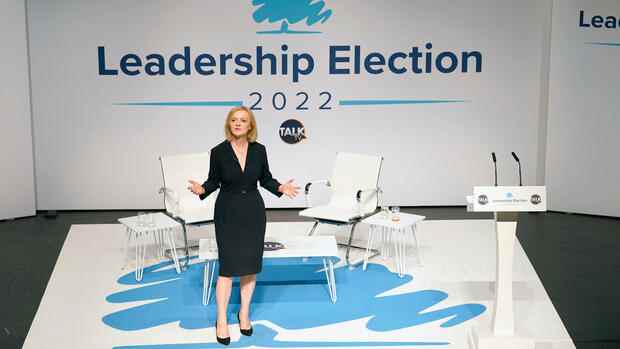London Liz Truss and Rishi Sunak have a problem that shouldn’t even exist: energy. For a long time, Great Britain thought it was safe from the European energy crisis. In contrast to the EU, which gets around 40 percent of its gas consumption from Russia, the figure in the UK is only four percent.
It seems all the more surprising that the energy crisis is now escalating earlier in the island kingdom than on the continent – and the two rivals for the presidency of the Conservative Party are finding it difficult to explain. The reason for this is that Great Britain is also feeling the price pressure in the pipelines via the European supply network and the global gas market.
The average UK household’s energy bill could climb to more than £4,200 (about €7,500) by January, according to the latest forecasts by market researchers Cornwall Insight. That would be double the figure for the previous year. The opposition Labor Party is already warning that low-income households would then only have a choice between “heating or eating”.
The British, known for their composure in times of crisis, react with displeasure: More than 40 percent of them fear social unrest in winter, and more than half consider a payment boycott of energy bills to be justified. This was shown by a new survey by the opinion research institute Savanta. More than 100,000 Brits are said to have already joined the Don’t Pay UK campaign.
Top jobs of the day
Find the best jobs now and
be notified by email.
Politicians are reacting to the biggest economic crisis in the country in 50 years with panic: the current Prime Minister Boris Johnson promises quick help, but wants to leave it to his successor. Sunak and Truss outdo each other almost every day with new suggestions. The former finance minister relies on targeted financial aid for poorer households.
The former Finance Minister relies on targeted financial aid for poorer households.
(Photo: AP)
Until recently, the British Foreign Secretary rejected such state “alms” and would rather help her compatriots in a “conservative way” – i.e. with tax cuts. British Deputy Prime Minister and Sunak supporter Dominic Raab has described this as “political suicide” for the ruling Tories with a view to the next general election.
Other party members also accuse Truss of social indifference and are calling for emergency aid in view of an inflation rate heading for 13 percent and an impending recession. The Tories fear that the protests against high energy prices – like the tax boycott of Margaret Thatcher’s poll tax in 1989 – could lead to the fall of the government.
Truss has now softened her tough stance under public pressure, promising she will “do whatever she can” to help Britons struggling with the high cost of living. The fact that she is struggling with this is mainly due to her calculation of winning over the approximately 180,000 members of the Conservative Party, who will elect a new party leader and thus also a prime minister by September 5, with “conservative” election promises. Their electoral strategists assume that the Tories’ party base, unlike most Britons, favors tax cuts and a growth-oriented supply-side policy.
But who are these almost 0.3 percent of the British population who decide on the next prime minister? “Older, wealthy, white Southerners may be a bit of a caricature, but it’s not that far from the truth,” Tim Bale, a political scientist at Queen Mary University in London, recently described the stereotype about the usual Tory.
Food donations during a strike by British Telecom (BT) workers.
(Photo: Bloomberg)
The term ‘Southerner’ suggests that more than 40 per cent of the party’s base live in southern England, according to Bale. However, one must add that about three quarters of the Tories are staunch Brexit supporters, which is why Truss and Sunak have not only announced a tough course in the dispute with the EU over the trade agreement (Northern Ireland Protocol), but also the City of London and the Want to free the rest of the economy from the “shackles” of the old EU rules.
However, recent research shows that members of the Conservative Party may not be that different from the rest of the country. A study by the British think tank “More in Common” reveals that for more than 40 percent of the Tories, the high cost of living is currently the most important issue in the country.
Conservative crisis management
That doesn’t mean, however, that party supporters agree on how the next prime minister should deal with the crisis. Truss has emphasized at each of the previous town hall events that she wants to look for “conservative” ways out of the misery. However, when the favorite of the party’s right wing recently suggested that civil service pay be differentiated by region according to the cost of living, she had to backtrack after a storm of protests from her own party friends in the northern parts of the country.
The Conservatives’ dilemma is that they are heavily reliant on the voters they were able to attract in 2019 from former Labor strongholds in the North. Ideologically, however, the party is still committed to its arch-conservative base, which is predominantly anchored in the south of the country.
While Sunak is less considerate of this and presents himself as the candidate of the conservative voters, Truss serves the more conservative wishes of the party base. This will probably win her the race against Sunak, but antagonize many Brits.
More: “There will be another package” – Scholz wants to bring further relief on the way
